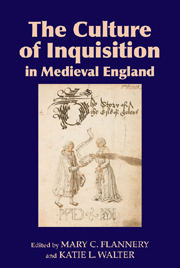Book contents
- Frontmatter
- Contents
- Illustrations
- List of Contributors
- Acknowledgements
- Abbreviations
- Introduction: Imagining Inquisition
- 1 Inquisition, Public Fame and Confession: General Rules and English Practice
- 2 The Imperatives of Denunciatio: Disclosing Others' Sins to Disciplinary Authorities
- 3 English Provincial Constitutions and Inquisition into Lollardy
- 4 The Contest over the Public Imagination of Inquisition, 1380–1430
- 5 ‘Vttirli Onknowe’? Modes of Inquiry and the Dynamics of Interiority in Vernacular Literature
- 6 From Defacement to Restoration: Inquisition, Confession and Thomas Usk's Appeal and Testament of Love
- 7 Confession, Inquisition and Exemplarity in The Erle of Tolous and Other Middle English Romances
- 8 Heresy Inquisition and Authorship, 1400–1560
- 9 Imitating Inquisition: Dialectical Bias in Protestant Prison Writings
- 10 Response Essay: Chaucer's Inquisition
- Bibliography
- Index
5 - ‘Vttirli Onknowe’? Modes of Inquiry and the Dynamics of Interiority in Vernacular Literature
Published online by Cambridge University Press: 05 April 2013
- Frontmatter
- Contents
- Illustrations
- List of Contributors
- Acknowledgements
- Abbreviations
- Introduction: Imagining Inquisition
- 1 Inquisition, Public Fame and Confession: General Rules and English Practice
- 2 The Imperatives of Denunciatio: Disclosing Others' Sins to Disciplinary Authorities
- 3 English Provincial Constitutions and Inquisition into Lollardy
- 4 The Contest over the Public Imagination of Inquisition, 1380–1430
- 5 ‘Vttirli Onknowe’? Modes of Inquiry and the Dynamics of Interiority in Vernacular Literature
- 6 From Defacement to Restoration: Inquisition, Confession and Thomas Usk's Appeal and Testament of Love
- 7 Confession, Inquisition and Exemplarity in The Erle of Tolous and Other Middle English Romances
- 8 Heresy Inquisition and Authorship, 1400–1560
- 9 Imitating Inquisition: Dialectical Bias in Protestant Prison Writings
- 10 Response Essay: Chaucer's Inquisition
- Bibliography
- Index
Summary
In the prologue to his tale, Chaucer's Pardoner gleefully outlines his methods of conning money out of gullible, God-fearing churchgoers with his preaching. From his public stage in the pulpit, the Pardoner employs various methods to persuade his audience to repent—and to part with their money; as he confesses to his fellow pilgrims, ‘myn entente is nat but for to wynne, / And nothyng for correccioun of synne’ (VI.403–04). Here and elsewhere in the Pardoner's prologue, Chaucer places great emphasis on this concept of ‘entente’; indeed, intention seems to be the criterion by which Chaucer asks that we judge the Pardoner. Yet the Pardoner's ability to gull his audience points precisely to the difficulty of discerning intent and of knowing certainly the interior state of an individual, a difficulty addressed at least in part by the sacrament of confession. According to the now-standard narrative, confession after the Fourth Lateran Council (1215) becomes a tool for fostering technologies for ‘making truth inside oneself’ and for generating interiorised subjectivity. In scholarship on medieval heresy, inquisition is likewise understood to have ‘the discovery of truth’ about an individual as its goal and the hidden interior as its terrain.
- Type
- Chapter
- Information
- The Culture of Inquisition in Medieval England , pp. 77 - 93Publisher: Boydell & BrewerPrint publication year: 2013



